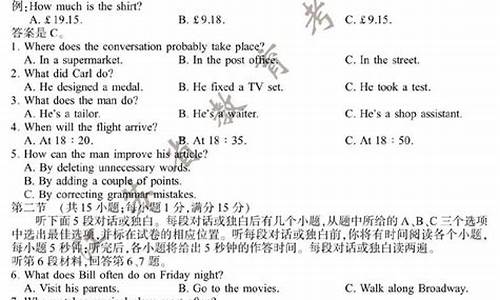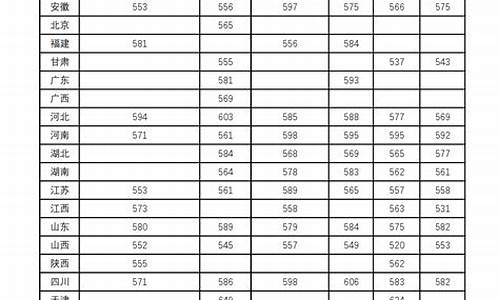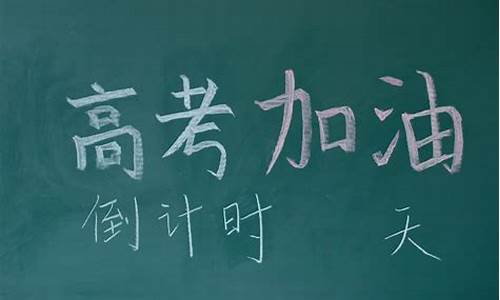您现在的位置是: 首页 > 教育新闻 教育新闻
江苏省高考英语答案_江苏省高考英语答案分析
tamoadmin 2024-05-21 人已围观
简介1.2010年高考英语江苏卷 - 阅读理解A江苏06高考新题型对话填空)模拟试题阅读下面对话,掌握其大意,并根据所给首字母的提示,在标有题号的右边横线上写出一个英语单词的完整、正确形式,使对话通顺。Lin Tao: Good morning, Doctor.Doctor: Good morning.!What’s the(1) m_____with you, young man?Lin Tao:
1.2010年高考英语江苏卷 - 阅读理解A

江苏06高考新题型对话填空)模拟试题
阅读下面对话,掌握其大意,并根据所给首字母的提示,在标有题号的右边横线上写出一个英语单词的完整、正确形式,使对话通顺。
Lin Tao: Good morning, Doctor.
Doctor: Good morning.!What’s the(1) m_____with you, young man?
Lin Tao: I’ve got a (2)h_____ and a cough, I’m afraid I’ll be(3) d .
Doctor: Don’t (4)w_______. It’s nothing serious. Have you taken (5)t_______ ?
Lin Tao: Yes, I have. (6)B_______ I haven’t got a fever
Doctor: How long have you been like this?
Lin Tao: (7)E______ since last night.
Doctor: Let me look (8)o_______ you. Open your mouth and say “Ahh”. Oh, it’s nothing serious. Just a cold. Take this (9)m________ three times a day and drink more water. You’ll be better soon.
Lin Tao: Thank you, Doctor.
Doctor: You’re (10)w________ .
2
阅读下面对话,掌握其大意,并根据所给首字母的提示,在标有题号的右边横线上写出一个英语单词的完整、正确形式,使对话通顺。
Jane:Mum,What will the weather be like tomorrow? Have you heard the weather report today?
Mum:Yes, why do you pay much more (1)a_______ to something about the weather
Jane: Oh,we’ve planned to go for a (2)p_______ .
Mum:The radio gives us the (3)i_______ that there’ll be rain..
Jane: What a (4)s_______ ! Our plan can’t be (5)c______ out.
Mum:You know sometimes the (6)w________ makes mistakes.
Jane: I hope he’s made a mistake again this time.
Mum:Why not play computer (7)g________ at home if it rains ?
Jane: I'm afraid I (8)p________ to go to the (9)m_______ rather than do that.
Mum: OK. It's good to see an interesting film on (10)r_______ days.
3
阅读下面对话,掌握其大意,并根据所给首字母的提示,在标有题号的右边横线上写出一个英语单词的完整、正确形式,使对话通顺。
W: Good evening, sir. I was told that you were robbed.
M: I certainly was.
W:When did that happen?
M: About two hours ago.
W: Why didn’t you (1) r______ it then?
M: I couldn’t. I was tied to a chair and my mouth was (2) f______ with something.
W: Please tell me exactly what happened.
M: I was sitting in this room watching TV when someone (3)k at the door.
Without thinking, I opened it.
W: That wasn’t very wise, sir.
M: I know. I was (4) e_____ my wife, you see, and I (5) t______ it was her.
W: You should never open a door without going to see who it is.
M: Yes, I regret that now.
W: What happened?
M: Two men pushed inside and then (6) t______ me with a knife.
W: Did you take a good look at them?
M: I’m afraid not, They were both (7)w stockings over their faces.
W: What did they take?
M: My wallet with $200 in it, my watch, and some of my wife’s (8) j______ from my bedroom.
W: They don’t seem to have done much damage to the flat.
M: No. They had just begun to search when the dogs next (9) d______ began to bark. They ran off. It was some time (10) b my wife returned and set me free. I phoned the police at once.
W: My men began searching the area as soon as we received your call. I can’t promise you that we’ll recover your property, but we’ll certainly do our best.
4
A: Morning! What can I do for you?
B: We’d like to (1)make a trip for a weekend holiday, please.
A: (2)There are many travel paths. Which one would you like to choose?
B: We’d like to choose Jinggang (3)mountains.
A: It’s really worth (4)visiting Which hotel do you want to stay in?
B: We’re not sure. Which hotel do you think is good and (5)tidy?
A: The Holiday Home ,but it’s a bit more (6)expensive.
B:It doesn’t (7)matter whether we’ll spend more money living such a hotel.
A: Could you please fill in this form?
B:OK .I’ll ask my wife to fill in this form. By the way, is it all right if we pay by (8)credit card?
A :(9)Certainly, it is quite all right And (10)enjoy your weekend.
B:Thank you.
5
A: Betty, we haven't been out for over a month. Let's go (1)s this evening.
B: Fine. Where would you like to go? To see a film or to watch a play?
A: A modern (2)t is on this week. Let's go and watch it, shall we?
B: The newspaper said it was the (3)least interesting play of the year.
A: How about the film "World Without Thieves"? That should be (4)e .
B: We've already seen it. Don't you (5)r ?
A: Then let's go to the (6)n cinema. The film "Not One Less" is being (7)s .
B: Good. What time does it (8)s .
A: 15 minutes ago. We just (9)m it.
B: Well, Will you please go back together with me to get my (10)d camera and then go to the park?
A:That’s a good idea.
答案
1
1.matter 2.headache 3.dead 4.worry 5.temperature 6.But 7.Ever 8.over 9.medicine 10.welcome
2
1.attention 2.picnic 3.information 4.shame 5.carried 6.weatherman 7.games 8.prefer 9.movie 10.rainy
3
1 report 2 filled 3 knocked 4 expecting 5 thought 6 threatened 7 wearing 8 jewellery 9 door 10 before
4
1.make 2.There 3.mountains 4.visiting 5.tidy 6.expensive 7.matter 8.credit 9.Certainly 10.enjoy
5
1.somewhere 2.theatre/theater 3.least 4.enjoyable/exciting 5.remember 6.neiborhood 7.shown 8.start 9.missed 10.digital
2010年高考英语江苏卷 - 阅读理解A
高考英语卷进行评析。阅卷专家们认为,江苏高考英语卷紧扣高中英语课程标准的教学要求,对考生在英语听力、词汇、语法、英语知识综合应用、阅读理解、书面表达等知识和能力进行了全面、深入的考察。
任务型阅读要求结合心理学分析新闻受众反应
第一部分的听力理解继续采用对话和独白等呈现方式,强调考生在常见语境中理解英语对话意义的能力,需要考生迅速建立话语交际的语境概念,分析讲话人的意图和含义,考察形式有细节信息、语音辨析、意图推测、结论判断等题型。
第二部分的英语知识运用包括单项填空和完型填空题,在题型和题量方面继续了近年的风格,覆盖高中阶段课程标准的教学重点和难点。完形填空的文章内容理解较为容易,但选项部分仍需要认真思考才能准确作答。
第三部分阅读理解部分的第一篇文章为配图的应用文体,内容涉及游客须知等旅游信息,第二篇为涉及旧的电子产品等工业废弃物与环保的关系,第三篇为涉及志愿者服务的动机分析文章,第四篇为关于“自由”与“责任”的议论文,题量分别为2、3、4、6。
任务型阅读的文章结合弗洛伊德心理学理论,分析了不同人群对新闻报道的接受习惯和反应特征,从新闻类别、读者反应、异类互渗等角度考察了考生在信息检索、内容归纳、语言结构等方面的知识与能力。
书面表达部分属于给材料作文的类型,提供了文字和图表相结合的三份材料,要求考生在概要叙述材料的基础上,分析导致交通问题的主要原因,并从社会规范和个人行为两方面讨论得到的启示。
凸显对考生思维能力和交往能力的考查
2015江苏高考英语卷体现了近年来鼓励学生扩大以英语为载体的知识面的导向性特征,继续突显了对外语思维能力和交际能力的考察,具体题型也呈现出改革和创新的特点。试卷第27题涉及到我国正在实施的“一带一路”国家战略,第29题涉及知名足球明星“C罗”,体现出英语教学与考生实际生活之间的关联。
书面表达延续了去年开始出现的新题型,总字数要求不变,但是增加了概要写作的任务,还凸显了考生分析材料和理解图表信息的能力,写作便于考生写出紧扣主题的个性化内容。
Usually, when your teacher asks a question, there is only one correct answer. But there is one question that has millions of current answers. That question is "What's your name?" Everyone gives a different answer,but everyone is correct.
通常,当你的老师问一个问题时,只有一个正确答案。但有一个问题目前有数百万个答案,这个问题就是“你叫什么名字?”每个人给出不同的答案,但每个人都是正确的。
Have you ever wondered about people's names? Where do they come from? What do they mean?
你有没有想过人们的名字?它们来自哪里?是什么意思
People's first names, or given names, are chosen by their parents. Sometimes the name of a grandparent or other member of the family is used. Some parents choose the name of a well-known person.A boy could be named George Washington Smith; a girl could be named Helen Keller Jones.
人们的名字由父母决定。有时使用祖父母或其他家庭成员的名字。一些父母选择名人的名字,男孩可以叫乔治·华盛顿·史密斯,女孩可以叫海伦·凯勒·琼斯。
Some people give their children names that mean good things.Clara means"bright"; Beatrice means "one who gives happiness"; Donald means"world ruler"; Leonard means"as brave as a lion".
有些人给孩子起的名字意味着好的寓意。Clara(克拉拉)的意思是“聪明的”;Beatrice(比阿特丽斯)的意思是“给人幸福的人”;Donald(唐纳德)的意思是“世界统治者”;Leonard(伦纳德)的意思是“像狮子一样勇敢”。
The earliest last names, or surnames, were taken from place names. A family with the name Brook or Brooks probably lived near brook; someone who was called Longstreet probably lived on a long, paved road. The Greenwood family lived in or near a leafy forest.
最早的姓氏来自地名。Brook(布鲁克)或Brooks(布鲁克斯)家族可能住在brook(小溪)旁;一个叫Longstreet的人可能住在一条长长的公路上。Greenwood一家住在一片茂密的森林里或附近。
Other early surnames came from people's occupations. The most common occupational name is Smith, which means a person who makes things with iron or other metals. In the past, smiths were very important workers in every town and village. Some other occupational names are: Carter﹣a person who owned or drove a cart; Potter﹣a person who made pots and pans.
其他早期姓氏来自人们的职业。最常见的职业名称是Smith,意思是用铁或其他金属制造物品的人。过去,smith是每个城镇和村庄非常重要的工人。其他一些职业名称是:Carter﹣拥有或驾驶手推车的人;Potter﹣制造锅碗瓢盆的人。
The ancestors of the Baker family probably baked bread for their neighbors in their native village.The Carpenter's great-great-great-grandfather probably built houses and furniture. Sometimes people were known for the color of their hair or skin, or their size, or their special abilities. When there were two men who were named John in the same village, the John with the gray hair probably became John Gray. Or the John was very tall could call himself John Tallman. John Fish was probably an excellent swimmer and John Lightfoot was probably a fast runner or a good dancer.
Baker(贝克)家族的祖先可能为他们家乡的邻居烤面包。Carpenter的远祖可能建造房屋和家具。有时,人们因头发或皮肤的颜色、体型或特殊能力而闻名。当同一个村子里有两个叫John(约翰)的人时,灰色头发的约翰可能会变成John Gray。或者John很高,可以称自己为John Tallman。John Fish可能是一名优秀的游泳运动员,John Lightfoot可能是一名跑步运动员或优秀的舞者。
Some family names were made by adding something to the father's name. English-speaking people added -s or -son. The Johnsons are descendants of John; the Roberts family's ancestor was Robert. Irish and Scottish people added Mac or Mc or O. Perhaps all of the MacDonnells and the McDonnells and the O'Donnells are descendants of the same Donnell.
有些姓氏是在父亲的名字上加了一些字母。说英语添加-s获-son。Johnsons一家是John的后代;Roberts一家的祖先是Robert。爱尔兰和苏格兰人添加Mac或Mc或O。也许所有的MacDonnells家族、McDonnells家族和O'Donnells家族都是Donnell家族的后代。









